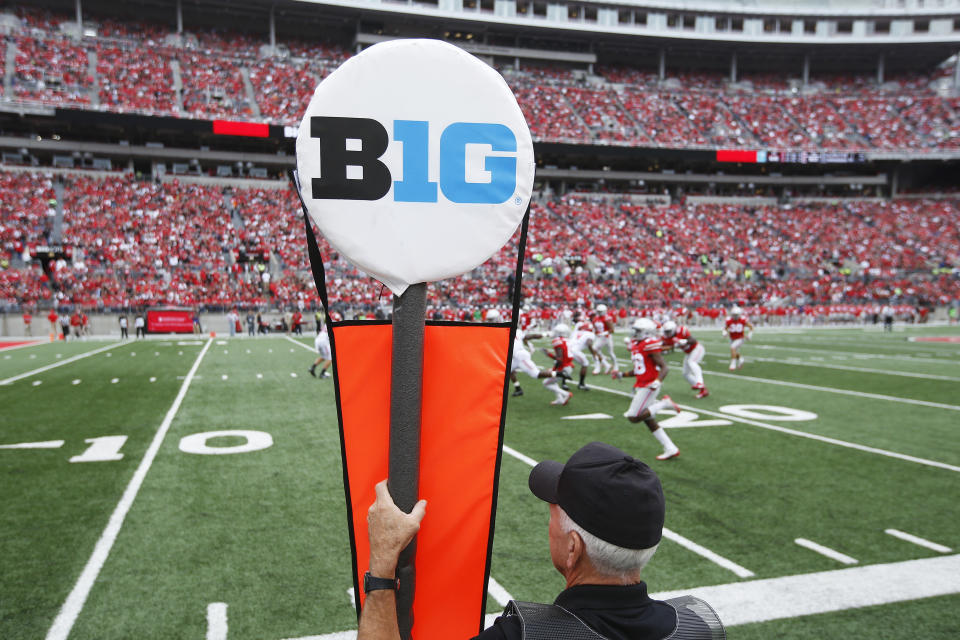The health of college athletes shouldn't be sacrificed in order for a return to normalcy
The headline was alarming: Roughly one-third of Big Ten student-athletes who tested positive for COVID-19 were found through cardiac MRIs to have myocarditis after contracting the disease.
It wasn’t entirely true, however. While Penn State athletics doctor Dr. Wayne Sebastianelli did make those comments to a group of school directors, what was left unsaid was that not all of the Big Ten student-athletes who were COVID-positive had undergone cardiac MRIs, and it wasn’t clear why those who did undergo the testing were chosen for it.
But doctors are seeing myocarditis, the inflammation of the heart muscle, in COVID-19 patients, which should give us pause, especially when it comes to the desire of many to forge ahead with the FBS season in spite of the potential risks and unknowns.
Yes, returning to some sense of “normalcy” is nice, but why must the health of even one young adult be sacrificed in order for us to get it?
“People need to understand that we’re in the early days of this pandemic,” Dr. Krutika Kuppalli, an expert in infectious disease and biosecurity, said on Thursday night. “We’re only eight months in. We still don’t understand the medium- and long-term consequences of COVID-19.”
Kuppalli points to a study published by the Journal of the American Medical Association at the end of July which included 100 people who had recovered from COVID-19. Cardiac MRI testing showed abnormal results for 78 of those individuals, including 60 with ongoing myocardial inflammation. It’s a small sample given that millions of people worldwide have contracted COVID-19, but as the study concludes, it’s enough to indicate that scientists need to do more research on the cardiac effects of the disease.
“There are some percentage of people that are going to have ongoing inflammation. I think we still need to understand who those people are, what about their disease causes that, and we need to understand what the long-term consequences are of having inflammation around the heart,” Kuppalli said. “And so extrapolating from young, healthy college athletes we need to understand how long the inflammation around the heart exists, what that means for them in the short-term, medium-term and long-term.
“We don’t want to be putting them at unnecessary risks. These are young adults and they have their whole lives ahead of them, and we want to make sure we’re not doing any harm to them.”

Like anyone who is found to have myocarditis, rest is crucial for athletes with the condition. Myocarditis can have its own side effects, such as irregular heartbeat, and more severe cases can lead to long-term cardiac damage. Before any athlete can return to full-speed practices and competition, they need to be cleared of those concerns by a cardiologist.
In other words, saying college athletes are young and healthy and won’t be affected if they contract COVID-19 or pointing to the lower percentage of younger people who are dying isn’t just wrong, it’s crazy. If your sibling or best friend got into a car accident and suffered a leg injury that hampered them for the rest of their days, would you really look at them at say, “Well, at least you didn’t die?”
As a related aside, what if an NFL prospect, who otherwise was perfectly healthy, contracts COVID-19 this season, develops myocarditis and it’s so severe he can’t be cleared to play, thus ending his professional dream — will his college reimburse him for the earnings he lost out on?
Like so many things in this country, COVID-19 has come to be about economics and politics. The NCAA has already shown us that, at least in terms of economics. Last month, it canceled all fall sports championships, except in Division I football which — surprise! — pulls in millions of dollars for member schools and conferences each year.
Players, who don’t get paid anything let alone seven-figure salaries like many of their coaches, are torn, some no doubt blinded by the foolishness of youth, not thinking about their quality of life in 40 or even 20 years.
The coaches, some of whom seem to look at the athletes in the same way, aren’t doctors and scientists. Pro-style offenses are their expertise, not pandemics.
Big Ten commissioner Kevin Warren, in particular, has come under fire for the decision to cancel the conference’s season, citing the experts we all should be listening to at this time.
That includes Kuppalli.
“I think we need to think about what the potential long-term repercussions are for our young athletes and weigh the risks and benefits, and weigh the data that we already have and really think about what that could mean for them,” she said. “I think it’s better to err on the side of caution so we don’t do any harm.”
More from Yahoo Sports:
